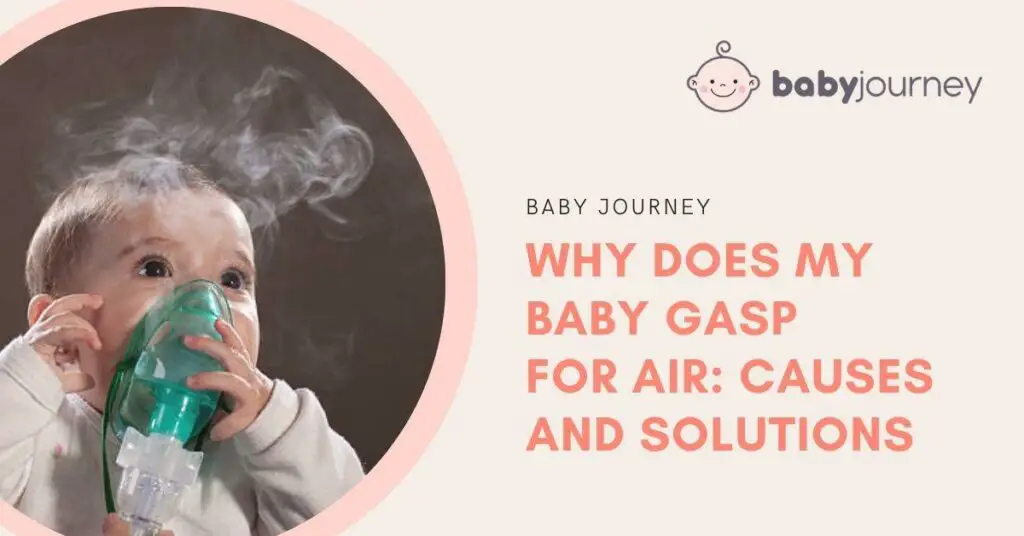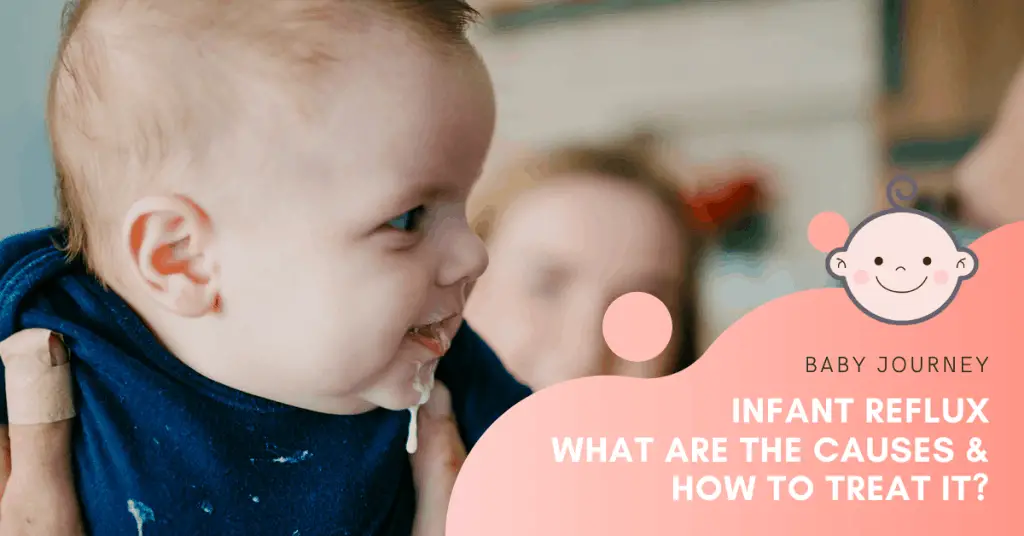You must be wondering why does my baby gasp for air? Gasping for air is a common occurrence in babies and can be a cause of concern for new parents. Newborn babies are still developing their respiratory system, and gasping can be a sign of an underlying issue. While some causes of gasping are harmless, others require immediate medical attention.
One of the most common reasons for gasping is due to the baby’s underdeveloped respiratory system. This can cause them to take short, quick breaths or gasp for air. Additionally, babies are more susceptible to respiratory infections, which can cause them to gasp for air. In some cases, gasping can be a sign of a more serious condition, such as asthma or laryngomalacia. It is important for parents to be aware of the different causes of gasping and seek medical attention if they are concerned.
Overall, gasping for air in young babies can be a normal part of their development, but it is important to be aware of the different causes and when to seek medical attention. By understanding the different reasons for gasping, parents can better care for their newborn baby and ensure their health and well-being.
Understanding Baby’s Breathing Patterns
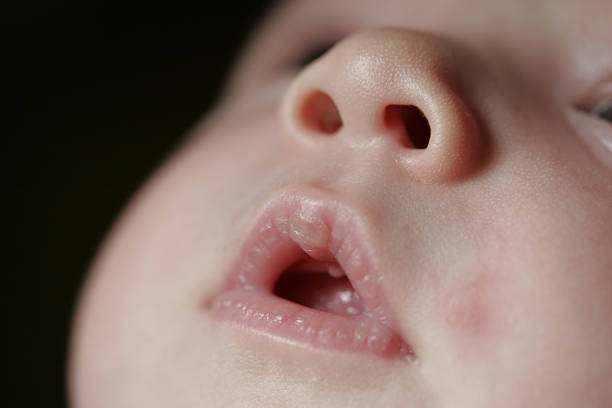
Newborn babies have a unique breathing pattern that may seem strange to new parents. It is normal for babies to breathe faster than adults, taking between 30 to 60 breaths per minute. Their breathing may also be irregular, with pauses between breaths that can last from half an hour or up to 10 seconds.
During these pauses, babies may appear to be gasping for air, which can be alarming for parents. However, this is a normal part of their breathing pattern. It is important to note that babies may also have brief periods of rapid breathing, which is also normal.
Babies are born with non-inflated lungs that are filled with fluid. The first breath a baby takes after birth helps to clear the fluid from their lungs and allows them to take in air. This first breath may sound like a gasp, but it is a necessary part of the breathing process.
Parents should also be aware that babies may have different breathing patterns during sleep than when they are awake. It is common for babies to have brief pauses in their breathing during sleep, which is known as sleep apnea.
While these breathing patterns may seem unusual, they are normal for most babies anyway. However, if parents have concerns about their baby’s breathing or notice any changes in their breathing pattern, they should contact their child’s pediatrician.
Here are some key takeaways to remember about baby’s breathing patterns:
- Newborn babies breathe faster than adults, taking between 30 to 60 breaths per minute.
- Their breathing may be irregular, with pauses between breaths that can last up to 10 seconds.
- Babies may also have brief periods of rapid breathing, which is normal.
- The first breath a baby takes after birth may sound like a gasp, but it is a necessary part of the breathing process.
- Babies may have different breathing patterns during sleep than when they are awake.
- If parents have concerns about their baby’s breathing or notice any changes in their breathing pattern, they should contact their pediatrician.
Causes of Gasp for Air in Babies
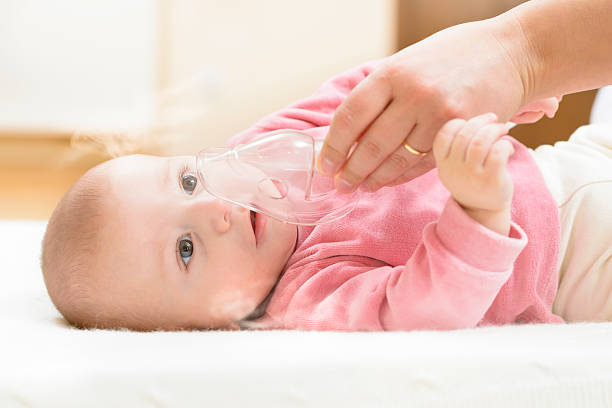
Babies can gasp for air for various reasons, which can range from normal developmental milestones to serious medical conditions. Here are some of the common causes of gasping for air in babies:
Reflux
Reflux is a common condition in babies, which occurs when the contents of the stomach flow back into the esophagus. This can cause discomfort, pain, and difficulty breathing, leading to gasping for air. Reflux can be managed by making changes to the baby’s feeding routine, such as feeding smaller amounts more frequently, keeping the baby upright after feeding, and avoiding certain foods.
Laryngomalacia
Laryngomalacia is a condition in which the tissues of the larynx are soft and floppy, causing them to collapse during breathing. This can lead to noisy breathing, labored breathing, difficulty breathing, and gasping for air. Laryngomalacia is usually a benign condition that resolves on its own as the baby grows older. However, in severe cases, surgery may be required.
Bronchiolitis
Bronchiolitis is a viral infection that affects the lower and upper respiratory tract together, causing inflammation and narrowing of the airways. This can lead to wheezing, coughing, and difficulty breathing, which can result in gasping for air. Bronchiolitis is common in babies and young children, and treatment may include supportive care, such as fluids and oxygen, and medications to relieve symptoms.
Whooping Cough
Whooping cough, also known as pertussis, is a highly contagious bacterial infection that affects the respiratory system. It can cause severe and persistent coughing and spells, which can lead to gasping for air and even vomiting. Whooping cough is especially dangerous in babies, and vaccination is the best way to prevent it.
In conclusion, gasping for air in babies can be caused by a variety of factors, ranging from minor to serious. Parents should consult with their pediatrician immediately if they notice their baby gasping for air, especially if it is accompanied by other symptoms such as fever, cough, or difficulty feeding.
Signs and Symptoms

When a baby gasps for air, it can be a terrifying experience for parents. However, it’s essential to understand that not all gasping is a cause for alarm. Here are some signs and symptoms babies gasping that may indicate a problem:
- Stridor: Laryngomalacia, a disorder in which the soft tissues of the larynx collapse when breathing, is characterized by a harsh, squeaky sound made when breathing in. This sound can start as soon as the baby is born or in the first few weeks after birth. Symptoms usually get worse over several months.
- Apnea: Sleep apnea is a somewhat common issue among people in general, and it can also be present in newborn babies and infants. It occurs when a baby is sleeping. The infant’s breathing abruptly ceases for a few seconds, followed by a loud gasp as the airway reopens.
- Cyanosis: Cyanosis is when a baby’s skin, lips, and nails turn blue or gray due to a lack of oxygen in the blood. It can be a sign of a respiratory problem, and parents should seek medical attention immediately.
- Difficulty Feeding: Babies with respiratory problems may have difficulty feeding and may need to take frequent breaks during feeding to catch their breath. They may also show signs of fatigue and not finish a feeding.
- Retractions: Retractions are when the skin between the ribs and around the neck appears to suck in with each breath. This can be a sign of respiratory distress and requires immediate medical attention.
If a baby is showing any of these signs and symptoms, it’s essential to seek medical attention immediately. If left untreated, respiratory problems can lead to more severe complications, including respiratory failure.
When to Seek Medical Help
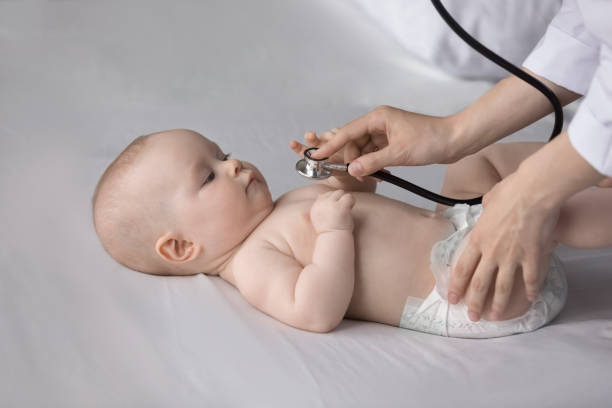
If a parent notices their baby gasping for air, it is important to seek medical attention. While some causes of gasping may be harmless, others may require immediate treatment. The following are some situations where a parent should seek medical help:
- If a baby stops breathing or turns blue: This is a medical emergency and requires immediate attention. Call 911 or seek emergency medical care.
- If a baby has a high fever: A fever can be a sign of a serious infection and can cause breathing difficulties. A doctor should evaluate the baby.
- If a baby has trouble breathing: If a baby appears to be struggling to breathe, has rapid breathing, or is using their chest muscles to breathe, it is important to seek medical attention.
- If a baby has a cough: A persistent cough can be a sign of an underlying condition, such as pneumonia or bronchitis, and should be evaluated by a doctor.
- If a baby has a history of respiratory problems: If a baby has a history of respiratory problems, such as asthma or bronchitis, it is important to monitor them closely and seek medical attention if their symptoms worsen.
In summary, if a parent notices their baby gasping for air or having any breathing difficulties, it is important to seek medical attention. Some causes may be harmless, but others may require immediate treatment. Parents should trust their instincts and seek medical help if they feel their baby’s condition is serious.
Diagnosis and Tests
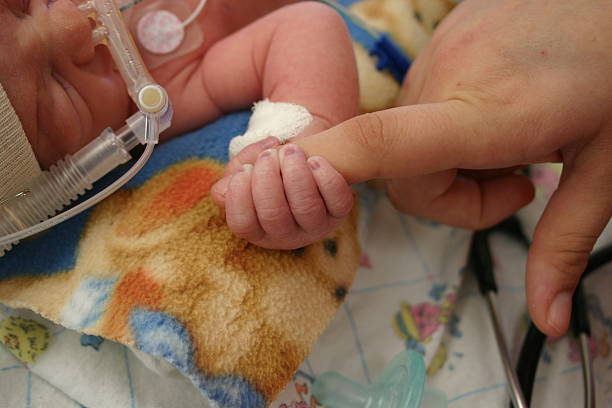
If a baby is gasping for air, it is important to seek medical attention immediately. The doctor will perform a physical exam and may order tests to determine the underlying cause of the gasping.
Some of the tests that may be ordered include:
- Pulse oximetry: This test measures the oxygen level in the blood and can help determine if the baby is getting enough oxygen.
- Chest X-ray: This test can help identify any abnormalities in the lungs or chest, such as pneumonia or a collapsed lung.
- Blood tests: These tests can help identify any infections or other conditions that may be causing the gasping.
- Echocardiogram: This test uses sound waves to create images of the heart and can help identify any heart problems that may be causing the gasping.
- Sleep study: This test can help determine if the baby has obstructive sleep apnea, which can cause gasping during sleep.
In some cases, the doctor may refer the baby to a specialist, such as a pediatric pulmonologist or cardiologist, for further evaluation and treatment.
It is important to note that while gasping for air can be a sign of a serious condition, it can also be a normal part of a baby’s development. If a baby’s doctor is otherwise healthy and there are no other concerning symptoms, the doctor may simply monitor the baby and recommend measures to alleviate any discomfort, such as using a humidifier or saline drops to help clear the nasal passages.
Treatment and Management
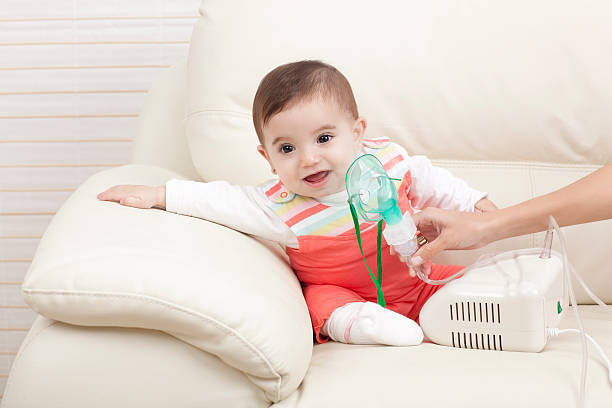
If your baby is gasping for air, there are several ways to manage and treat the condition. Treatment options may vary depending on the underlying cause of the gasping and the severity of the symptoms.
Home Remedies
For mild cases of gasping, home remedies may be effective in alleviating symptoms. Here are some home remedies that may help:
- Positioning: Try positioning your baby on their side or stomach to help relieve pressure on their chest.
- Burping: Burping your baby after feedings can help release excess air in their stomach, reducing the likelihood of gasping.
- Humidifier: Using a humidifier in your baby’s room can help keep the air moist, reducing congestion and making it easier for them to breathe.
- Steam: Taking your baby into a steamy bathroom or using a warm, damp cloth on their face can help open up their airways.
Medical Interventions
In more severe cases, medical interventions may be necessary. Here are some medical treatments that may be used:
- Medications: Medications such as bronchodilators or steroids may be prescribed to help open up the airways and reduce inflammation.
- Oxygen therapy: If your baby is having difficulty breathing, they may require supplemental oxygen to help them breathe more easily.
- Hospitalization: In severe cases, hospitalization may be necessary to closely monitor your baby’s condition and provide more intensive treatment.
It’s important to consult with a healthcare provider if your baby is gasping for air, as they can help determine the underlying cause and provide appropriate treatment.
Preventing Future Episodes

Preventing future episodes of gasping for air in babies is crucial for their health and well-being. Here are some tips to help prevent future episodes:
1. Keep the baby’s sleeping area clean and free of allergens
Allergens such as dust, pet dander, and pollen can trigger respiratory problems in babies. Therefore, it is essential to keep the baby’s sleeping area clean and free of allergens. Use a vacuum cleaner with a HEPA filter to clean the baby’s room regularly.
2. Avoid smoking around the baby
Smoking is harmful to the baby’s respiratory system and can trigger respiratory problems such as asthma. Therefore, it is essential to avoid smoking around the baby. If someone in the household smokes, they should do so outside, away from the baby.
3. Breastfeed the baby
Breast milk contains antibodies that can help protect the baby from an upper respiratory infection or infections. Therefore, it is essential to breastfeed the baby if possible. If the mother cannot breastfeed, she should consider using a breast pump to express milk and feed the baby.
4. Keep the baby away from sick people
Respiratory infections are contagious and can spread quickly from person to person. Therefore, it is essential to keep the baby away from sick people, especially during cold and flu season.
5. Use a humidifier
Dry air can irritate the baby’s respiratory system and trigger respiratory problems. Therefore, it is essential to use a humidifier to add moisture to the air in the baby’s room. However, it is important not to over-humidify the room cold mist humidifier, as this can promote the growth of mold and bacteria.
By following these tips, parents can help prevent future episodes of gasping for air in their babies and promote their respiratory health.
Conclusion
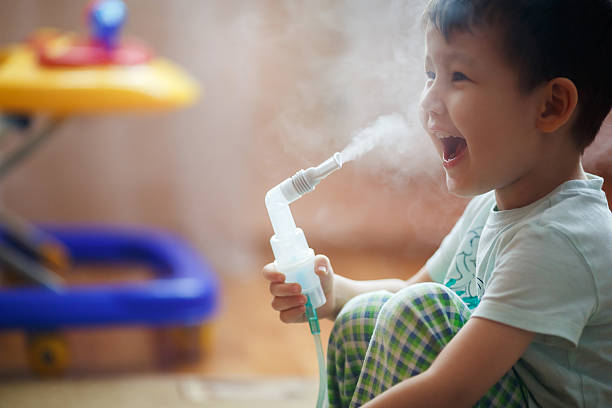
In conclusion, there are several reasons why a baby might gasp for air, some of which are normal and some of which require medical attention. It is important for parents to pay attention to their baby’s breathing patterns, especially during the first few months of life when their respiratory system is still developing.
If a baby is gasping for air while sleeping, it could be due to sleep apnea, which is a condition where the baby’s normal breathing, is interrupted during sleep. If a baby is gasping for air while awake, it could be due to a respiratory infection, asthma, or allergies.
Parents should also be aware that premature babies are more likely to have breathing problems due to their immature respiratory system. Additionally, babies born premature or who are exposed to secondhand smoke or other environmental pollutants may also experience severe breathing problems or difficulties.
If a baby is gasping for air and showing other signs of distress, such as blue lips or skin, parents should seek medical attention immediately. In some cases, gasping for air could be a sign of a more serious condition, such as a heart defect or lung disease.
Overall, while gasping for air can be a normal part of a baby’s development, it is important for parents to be aware of the potential causes and seek medical attention if necessary. By monitoring their baby’s breathing patterns and seeking medical attention when needed, parents can help ensure their baby’s respiratory health.
Frequently Asked Questions
Is it normal for a baby to gasp for air while sleeping?
Yes, it is normal for babies to gasp for air while sleeping. This is because their breathing patterns are not yet fully developed and rapid breaths may be irregular at times. However, if your baby is gasping for air excessively or with other symptoms, it is best to consult a pediatrician.
Why does my baby gasp for air randomly?
Gasping for air randomly can be due to a variety of reasons, including nasal congestion, allergies, or asthma. It can also be a sign of laryngomalacia, a condition in which the larynx collapses inward during breathing. If you are concerned about your baby’s gasping, it is best to seek medical advice.
Why does my baby gasp for air when excited?
When babies and older children get excited, they tend to breathe faster and may gasp for air. This is a normal response and nothing to worry about.
Why is my baby breathing like he’s out of breath?
If your baby is breathing like he’s out of breath, it could be a sign of an underlying medical condition such as asthma, pneumonia, or bronchiolitis. It is important to seek medical advice if you are concerned about your baby’s breathing.
Does laryngomalacia cause SIDS?
Laryngomalacia does not cause SIDS (Sudden Infant Death Syndrome). However, babies with laryngomalacia may be at a slightly higher risk of SIDS, so it is important to follow safe sleep practices recommended by the American Academy of Pediatrics.
Why does my baby gasp for air while breastfeeding?
Babies may gasp for air while breastfeeding if they are having difficulty latching or if they have a stuffy nose. It is important to make sure your baby’s nose is positioned correctly while breastfeeding and to clear their nose if necessary. If your baby continues to gasp for air while breastfeeding, it is best to seek medical advice.

